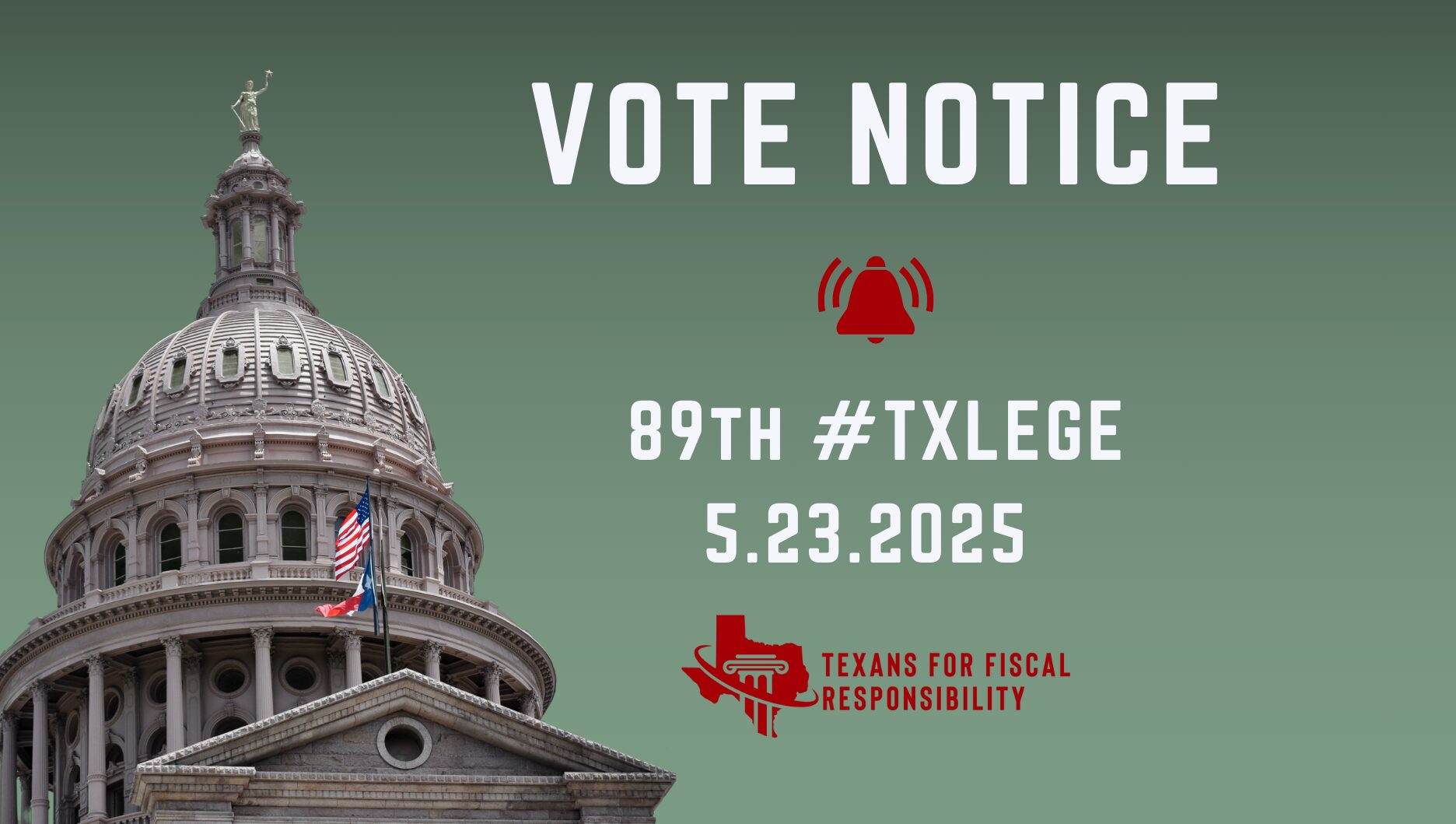
Texans for Fiscal Responsibility has issued the following vote notice for May 23rd, 2025
Texas House of Representatives
Subject: Senate Bill 6 (SB 6) – Government overreach in Energy
- Author: State Sen. Phil King (R-Weatherford)
- Caption: Relating to electricity planning and infrastructure costs for large loads.
- TFR Position: OPPOSE
- Background:
- The House version of SB 6 grants sweeping new powers to ERCOT and state regulators to micromanage how large electricity users connect to and operate on the grid. It allows ERCOT to forcibly shut down or curtail power to large industrial users during emergencies, likely impacting manufacturing, data, Artificial intelligence and cryptocurrency related businesses the hardest, potentially discouraging these businesses from moving to or expanding in Texas. Businesses would be required to install and disclose on-site generation and may be ordered to run it by ERCOT, potentially at great cost and liability. The bill imposes hefty upfront charges on large users for grid access—despite the fact they already pay ongoing transmission fees—amounting to double payment for infrastructure. Additionally, it opens the door for ERCOT to deny or impose conditions on private net metering arrangements, raising serious property rights concerns. Taxpayers are also on the hook for more than $2.6 million in new spending and nine new state bureaucrats to enforce these mandates.
- Instead of addressing the root cause of Texas’ energy instability — government subsidies for intermittent energy — the bill further distorts the market by shifting costs onto businesses rather than holding unreliable generators accountable. This government intervention expands bureaucracy, increases regulatory burdens, and forces ratepayers to subsidize grid management failures. The bill represents yet another attempt to “fix” ERCOT through top-down controls. Rather than promoting market efficiency, this bill grows government oversight, penalizes large employers, and replaces grid neutrality with regulatory discretion. It sends a troubling signal to businesses that investing in Texas energy infrastructure may come with unpredictable costs, rules, and power shutoff risks. A fiscally responsible approach would eliminate subsidies for all energy sources and let supply, demand, and competition dictate Texas’ energy future. For these reasons, TFR opposes SB 6.
Subject: Senate Bill 7 (SB 7) – Water Infrastructure Reform
- Author: State Sen. Charles Perry (R– Lubbock)
- Caption: Relating to the oversight and financing of certain water infrastructure matters under the jurisdiction of the Texas Water Development Board.
- TFR Position: SUPPORT / AMEND
- Background:
- SB 7, as substituted in the House, aims to address Texas water challenges by restructuring how water projects are planned and funded. It enhances coordination among public and private entities to reduce costs and minimize land seizures, while expanding the types of projects eligible for state support. The bill creates an administrative fund to cover oversight costs without directly expanding general government functions. From a limited government perspective, the effort to streamline bureaucracy and prevent duplicative infrastructure is commendable. However, the bill could be improved by tightening fiscal controls, capping administrative overhead, and requiring measurable performance outcomes. With careful amendments, this could be a good step toward securing water without growing bureaucracy unchecked.
Subject: Senate Bill 36 (SB 36) – DPS Homeland Security Division
- Author: State Sen. Tan Parker (R-Flower Mound)
- Caption: Relating to the homeland security activities of certain entities, including the establishment and operations of the Homeland Security Division in the Department of Public Safety.
- TFR Position: SUPPORT / AMEND
- Background:
- SB 36 proposes creating a Homeland Security Division within the Department of Public Safety to centralize and streamline Texas’ homeland security and border protection efforts. By consolidating leadership and planning into one dedicated division, the bill aims to eliminate inefficiencies, reduce redundancy among agencies, and improve coordination during emergencies and threats. The division would also manage intelligence gathering, oversee critical infrastructure protection, and coordinate with federal and local governments. The bill represents a more strategic and accountable use of state resources compared to the fragmented status quo. To strengthen the bill’s accountability, it should include annual performance audits, and require disclosure of outcomes and spending. These additions would ensure taxpayer dollars are used efficiently and transparently, while protecting the border and Texans from real and evolving threats.
Subject: Senate Bill 38 (SB 38) – Eviction for squatters
- Author: State Sen. Paul Bettencourt (R-Houston)
- Caption: Relating to the eviction from real property of certain persons not entitled to enter, occupy, or remain in possession of the premises.
- TFR Position: SUPPORT
- Background:
- SB 38 streamlines the eviction process in Texas, allowing landlords to quickly remove individuals who are unlawfully occupying residential properties. It creates clear timelines for courts, landlords, and tenants, and prevents delays that often cost property owners thousands in repairs, lost rent, and legal fees. The bill prohibits counterclaims and other legal tactics that can stall proceedings, ensuring that justice courts focus solely on determining who has the legal right to possess the property. It also allows for quicker judgments when there is no real dispute, saving everyone time and money. By requiring tenants who appeal to pay rent into a court registry and affirm their good-faith defense, the bill deters abuse of the appeals process. It empowers landlords to act when local law enforcement fails to execute writs in a timely manner, providing them with alternatives. This legislation supports property rights, reduces court burdens, and discourages abuse of housing laws.
Texas Senate
Subject: House Bill 143 (HB 143) – Fire prevention at well sites
- Author: State Rep. Ken King (R-Canadian)
- Caption: Relating to the authority of the Railroad Commission of Texas and the Public Utility Commission of Texas to address a failure by an operator to maintain an electrical power line serving a well site or certain surface facilities in accordance with the National Electrical Code.
- TFR Position: SUPPORT / AMEND
- Background:
- HB 143 enhances coordination between state regulatory agencies to prevent electrical hazards at oil and gas sites by codifying a Memorandum of Understanding into law. This proactive measure improves public safety and reduces the risk of wildfires or injury, potentially lowering future public expenditures on disaster response. The bill supports responsible oversight without creating new bureaucracies-leveraging existing regulatory bodies instead. However, the bill should be amended with clear limits on agency discretion, particularly in regards to the commission’s authority to “take any other action” considered necessary to address problematic conditions. This section should be better clarified and defined to prevent potential abuse. Additionally, the bill creates a duty of landowners to submit a report of a problem to the commission. This should be clarified to ensure property owners are not unduly burdened or held liable.
Subject: House Bill 2674 (HB 2674) – Homeschool Freedom
- Author: State Rep. David Cook (R-Mansfield)
- Caption: Relating to prohibiting the regulation of homeschool programs.
- TFR Position: SUPPORT
- Background:
- HB 2674 protects homeschool families from new government regulations by banning state education agencies from creating new rules that would increase oversight or control over homeschool programs. It ensures that parents can continue to educate their children at home without interference, preserving parental rights and educational freedom. By codifying current practice, the bill offers long-term stability and predictability for families who have opted out of the public school system. From a limited government perspective, the bill prevents bureaucratic expansion and keeps the state in its proper role. It respects educational choice and avoids taxpayer-funded regulatory overreach that could burden families and stifle innovation in home-based learning. H.B. 2674 also prevents a future administration from using agency rules to chip away at homeschool freedoms. This bill does not create any new programs, mandates, or spending. It’s a fiscally responsible move to keep government in check and empower parents to take the lead in their children’s education.
Subject: House Bill 3627 (HB 3627) – SBOE operational independence
- Author: State Rep. Carl Tepper (R-Lubbock)
- Caption: Relating to allowing the chair of the State Board of Education to employ personnel to assist in performing the board’s duties.
- TFR Position: SUPPORT
- Background:
- HB 3627 improves accountability and operational efficiency within the State Board of Education (SBOE) by allowing the elected Chair to hire a small team of direct support staff. This reform empowers elected leadership to fulfill its constitutional duties without relying solely on the Texas Education Agency (TEA), which is run by unelected bureaucrats. By ensuring these staff report directly to the SBOE Chair, the bill strengthens responsiveness to Texas voters. It also helps reduce dependency on TEA’s internal priorities, which may not always align with those of the SBOE or the public. While the bill adds modest recurring costs, it does so transparently and with legislative oversight, rather than creating unaccountable or bloated structures. These positions are limited in number and focus strictly on board support, not programmatic expansion. From a limited government standpoint, this helps to ensure that more authority and accountability rests with elected officials, not entrenched bureaucratic agencies.
Subject: House Bill 4076 (HB 4076) – Healthcare Freedom
- Author: State Rep. Jeff Leach (R-Allen)
- Caption: Relating to prohibiting organ transplant recipient discrimination on the basis of vaccination status.
- TFR Position: SUPPORT
- Background:
- HB 4076 ensures that Texans cannot be denied a life-saving organ transplant simply because of their vaccination choices. It safeguards patient rights by prohibiting transplant centers and providers from using blanket vaccination policies to exclude patients. Instead, medical decisions must be based on individualized assessments—not institutional mandates. It prevents bureaucratic overreach into deeply personal medical decisions and ensures fair access to care regardless of conformity to public health trends. The legislation also protects providers from being punished for respecting patient choice, reducing regulatory interference. For taxpayers and advocates of limited government, this bill reins in coercive mandates and promotes healthcare freedom.
Reminder: Vote Notices are provided to both Texas state lawmakers and the general public, sharing Texans for Fiscal Responsibility’s position on issues eligible to be rated as a part of the Fiscal Responsibility Index. Notices are provided prior to votes being taken in each legislative chamber.
Disclaimer: We reserve the right to consider amendments to legislation that may be introduced without notice as a part of issues to be rated on the Fiscal Responsibility Index. We will make every effort to provide notice on amendments that are pre-filed.




